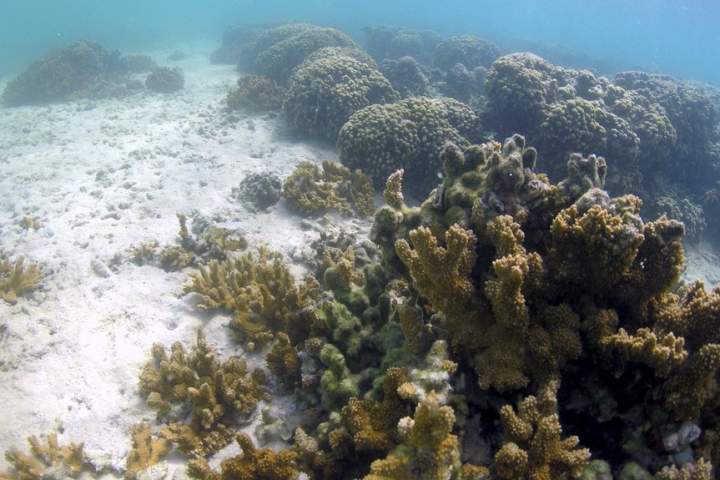Science
Coral Reefs Face Irreversible Damage, Scientists Warn Ahead of COP30

Global warming is accelerating past critical thresholds, leading to an alarming decline in the world’s coral reefs. Scientists have issued a stark warning that these ecosystems are nearing what they describe as an almost irreversible die-off, marking the first “tipping point” in climate-driven ecosystem collapse. This assessment comes from the Global Tipping Points report, compiled by a team of 160 researchers globally, just weeks before the COP30 climate summit in Brazil, which will take place near the Amazon rainforest.
The report highlights that the Amazon rainforest itself is now at a greater risk of collapse, particularly if the average global temperature rises beyond 1.5 degrees Celsius. This revision of the critical threshold underscores the urgent need for action, as deforestation rates continue to escalate. Additionally, the report raises concerns about potential disruptions to the Atlantic Meridional Overturning Circulation (AMOC), a key ocean current responsible for milder winters in northern Europe.
Urgent Call for Action
Dr. Tim Lenton, an environmental scientist at the University of Exeter and lead author of the report, emphasized the rapid changes occurring within the climate and biosphere. He stated, “Change is happening fast now, tragically, in parts of the climate, the biosphere.” Despite the grim outlook for coral reefs, Lenton noted some positive developments regarding the transition from fossil fuels. For the first time, renewable energy sources produced more electricity than coal this year, according to data from the nonprofit think tank Ember.
Lenton urged countries participating in the upcoming COP30 to take decisive steps to reduce carbon emissions. He expressed a desire for people not to feel completely powerless in the face of climate change, stating, “Nobody wants to be just traumatized and disempowered. We still have some agency.”
The report reveals that average global temperatures have already warmed by approximately 1.3 to 1.4 degrees Celsius compared to preindustrial levels, according to data from United Nations and European Union scientific agencies. The past two years have been recorded as the warmest on Earth, with marine heatwaves affecting 84 percent of the world’s coral reefs, leading to extensive bleaching and mortality in some cases. Coral reefs are vital, supporting roughly a quarter of marine life globally.
Climate Action Needed for Recovery
For coral reefs to recover, scientists indicate that global action must drastically increase to bring temperatures back down to just 1 degree Celsius above preindustrial averages. Pep Canadell, a senior scientist at the CSIRO Climate Science Centre in Australia, pointed out that the report underscores the escalating impacts of climate change. “The new report makes clear that each year there is an increase in the scope and magnitude of the negative impacts of climate change,” he stated.
Current projections suggest that the world is on track for approximately 3.1 degrees Celsius of warming this century, based on national policies. This trajectory highlights the critical importance of immediate and effective climate action to prevent further degradation of vital ecosystems like coral reefs and the Amazon rainforest. The findings of the Global Tipping Points report serve as a clarion call for nations to unite and combat the pressing challenges posed by climate change.
-

 Lifestyle2 months ago
Lifestyle2 months agoWinnipeg Celebrates Culinary Creativity During Le Burger Week 2025
-

 Health2 months ago
Health2 months agoMontreal’s Groupe Marcelle Leads Canadian Cosmetic Industry Growth
-

 Science2 months ago
Science2 months agoMicrosoft Confirms U.S. Law Overrules Canadian Data Sovereignty
-

 Education2 months ago
Education2 months agoRed River College Launches New Programs to Address Industry Needs
-

 Technology2 months ago
Technology2 months agoDragon Ball: Sparking! Zero Launching on Switch and Switch 2 This November
-

 Science2 months ago
Science2 months agoTech Innovator Amandipp Singh Transforms Hiring for Disabled
-

 Technology6 days ago
Technology6 days agoDiscord Faces Serious Security Breach Affecting Millions
-

 Technology2 months ago
Technology2 months agoGoogle Pixel 10 Pro Fold Specs Unveiled Ahead of Launch
-

 Science2 months ago
Science2 months agoChina’s Wukong Spacesuit Sets New Standard for AI in Space
-

 Technology2 months ago
Technology2 months agoWorld of Warcraft Players Buzz Over 19-Quest Bee Challenge
-

 Business2 months ago
Business2 months agoDawson City Residents Rally Around Buy Canadian Movement
-

 Technology1 week ago
Technology1 week agoHuawei MatePad 12X Redefines Tablet Experience for Professionals
-

 Education2 months ago
Education2 months agoAlberta Teachers’ Strike: Potential Impacts on Students and Families
-

 Business2 months ago
Business2 months agoNew Estimates Reveal ChatGPT-5 Energy Use Could Soar
-

 Science2 months ago
Science2 months agoXi Labs Innovates with New AI Operating System Set for 2025 Launch
-

 Technology2 months ago
Technology2 months agoInnovative 140W GaN Travel Adapter Combines Power and Convenience
-

 Technology2 months ago
Technology2 months agoFuture Entertainment Launches DDoD with Gameplay Trailer Showcase
-

 Technology2 months ago
Technology2 months agoGlobal Launch of Ragnarok M: Classic Set for September 3, 2025
-

 Technology2 months ago
Technology2 months agoArsanesia Unveils Smith’s Chronicles with Steam Page and Trailer
-

 Technology2 months ago
Technology2 months agoNew IDR01 Smart Ring Offers Advanced Sports Tracking for $169
-

 Science2 months ago
Science2 months agoNew Precision Approach to Treating Depression Tailors Care to Patients
-

 Business2 months ago
Business2 months agoBNA Brewing to Open New Bowling Alley in Downtown Penticton
-

 Technology2 months ago
Technology2 months agoHumanoid Robots Compete in Hilarious Debut Games in Beijing
-

 Health2 months ago
Health2 months agoGiant Boba and Unique Treats Take Center Stage at Ottawa’s Newest Bubble Tea Shop










